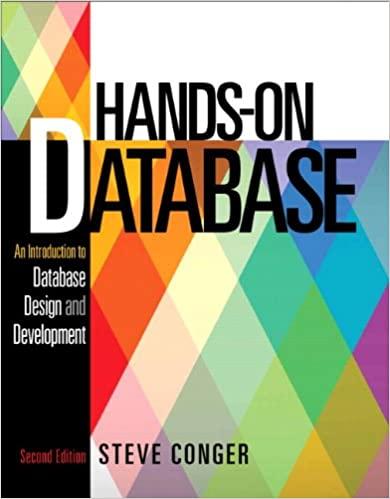Answered step by step
Verified Expert Solution
Question
1 Approved Answer
Which uses the least amount of storage? Question 1 1 options: 'example' stored in a column of type varchar ( 2 0 ) 'exam' stored
Which uses the least amount of storage?
Question options:
'example' stored in a column of type varchar
'exam' stored in a column of type varchar
ex stored in a column of type varchar
they all use the same amount of storage
Question point
Which statements are true about the ROUND function?
Question options:
It returns the number rounded to the specified precision
If the length is positive, the digits to the left of the decimal point are rounded
To truncate the function rather than round it code a zero value for the function
all of the above
Question point
The varchar and nvarchar data types to store variablelength strings. Which of the statements below is true?
Question options:
Data stored using these data types occupies only the number of bytes needed to store the string
They are typically used to define columns with a fixed number of characters.
In general, they are less efficient than fixedlength strings.
all of the above
Question point
The char and nchar data types are used to store fixedlength strings. Which of the statements below is true?
Question options:
Data stored using these data types occupies the same number of bytes regardless of the actual length of the string.
They are typically used to define columns that have a fixed number of characters
The char data type will always contain two characters
all of the above
Question point
If you assign a value with one data type to a column with another data type, SQL Server converts the value to the data type of the column using what?
Question options:
explicit conversion
implicit conversion
Unicode values
scientific notation
Step by Step Solution
There are 3 Steps involved in it
Step: 1

Get Instant Access to Expert-Tailored Solutions
See step-by-step solutions with expert insights and AI powered tools for academic success
Step: 2

Step: 3

Ace Your Homework with AI
Get the answers you need in no time with our AI-driven, step-by-step assistance
Get Started


